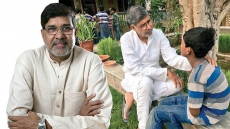AIL has supported more than 80 underground home schools for more than 3,000 girls in Afghanistan. According to AIL, more than 16 million Afghans have benefited from the organization’s education and health programme.
When Dr. Sakena Yacoobi, CEO of the Afghan Institute of Learning (AIL), was awarded the 2015 WISE Prize of Education, she redefined the fate and future of women across Afghanistan. As a crusader for women’s education, Dr. Yacoobi is campaigning to reform an education system crippled by previously imposed Taliban sanctions. Her organization, AIL, initially established to empower women and communities with education and health services, has expanded to include human rights programmes, leadership training courses, and free legal services for the underprivileged. By employing unique grassroots specific strategies, AIL has been able to serve hundreds of thousands of women and children each year.

It was an encounter with the Taliban a few years ago that pushed Dr. Yacoobi’s work out to the masses and drew prominent global attention towards her work and the dangers that individuals such as Dr. Yacoobi are exposed to. While Dr. Yaccobi was at a school one day, a group of armed men raided the education facility. “Of course, I thought they were going to kill me,” she tells media, “but I wasn’t scared. With the help of God, I stayed calm and defended myself, telling them how the Quran states a woman’s right to an equal education.” A 1990 Taliban-imposed ban prohibited females from receiving a formal education under the Taliban-controlled region, leaving a large part of the population aloof to rights and privileges.

Dr. Yacoobi was doing her Masters in the United States when the ban was announced but returned immediately after. “When I was over in the US, Russia invaded Afghanistan and suddenly I became a refugee. My family were refugees at home, so I had a rough life trying to study, get scholarships and jobs to support myself all the while worrying about my family.” Dr. Yacoobi tells media. “I went to the UN and fought for my rights, for my family’s rights and was able to sponsor them to come to the US.”

Since the ban, AIL has supported more than 80 underground home schools for more than 3,000 girls in Afghanistan. More than 16 million Afghans have benefited from AIL’s education and health programme. A revised curriculum proposed by the AIL has also been adopted by state-run institutes across the country. “I have dedicated my life to promoting the importance of education because I really believe it is the only way to bring peace,” Dr. Yacoobi said in a media interview. “Conflict is the result of ignorance. International governments spend billions of dollars on weapons – just think what that money could do if it went towards education.”

Dr. Yacoobi has six honorary doctorates from various institutions such as Princeton University. She was honoured in 2017 with the Sunhak Peace Prize and the Harold W. McGraw Prize in Education in 2016. She is also a recipient of the Opus Prize, Kravis Prize and Gruber Prize. She is a Skoll Social Entrepreneur, Schwab Social Entrepreneur, Ashoka fellow and was nominated as one of 1,000 women for the Nobel Peace Prize.

Dr. Yacoobi serves on a number of boards and panels including, New Global Citizens, the Advisory Council for the Center for Social Impact Learning at the Middlebury Institute of International Studies at Monterey, and is a former board member for the Global Fund for Women. She is an advisor to the Fetzer Institute, and is a member of the US-Afghan Women’s Council. Before founding AIL, Dr. Yacoobi was a professor at D’Etre University in Detroit, Michigan, and was Coordinator of the Women’s Programs for the International Rescue Committee in the Afghan refugee camps in Peshawar, Pakistan.
Photos: Afghan Institute of Learning - Creating Hope International/Facebook
